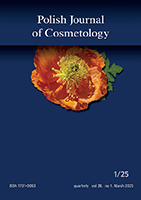search by
Copyright @ Pol J CosmetolKnowledge about acne among students of medical faculties - pretest-posttest studyKatarzyna Piotrowska, Hanna Myśliwiec, Iwona Flisiak Klinika Dermatologii i Wenerologii, Uniwersytet Medyczny w Białymstoku Summary Introduction. Acne vulgaris is a chronic, inflammatory disease of sebaceous glands and hair follicles. It is one of the most common skin disorders that affects up to 85% of adolescents, but can occur in any age group. Aim. The aim of the study was to analyze knowledge about acne and to assess the impact of classes conducted during the dermatology course on the level knowledge of acne among students of medical faculties. Material and methods. The study was conducted in the period from October 2017 to June 2018 in the group of 243 students of the medicine and dentistry of the Medical University of Bialystok. The research tool was the original survey. The ´pretest-posttest´ research method was used to evaluate the impact of classes conducted during the dermatology course on the level of students´ knowledge. Results. The most popular sources of knowledge about acne were the internet (66.7%), dermatologist (38.3%) and family and friends (36.6%). The average number of points from the test before the classes of dermatology course was 16.4 (±3.5), and after classes was 19.5 (±2.1), (p<0.05). In the pretest the most numerous group were students with an average level of knowledge about acne (n:146, 60.1%). In the posttest the most numerous group were the respondents with a high level of knowledge (n:175, 72.0%). Conclusions. The pretest-posttest research method used in the study provided important information what issues related to acne cause the most problems for students. Key words: acne vulgaris, knowledge, pretest-posttest, students |




